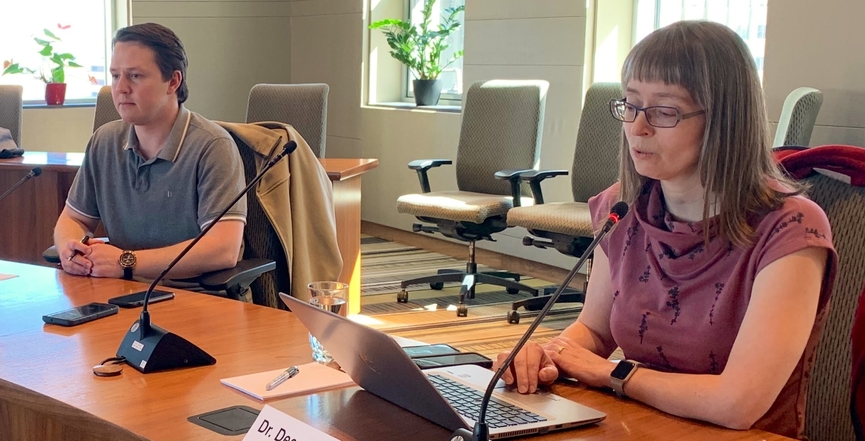By insisting Alberta’s meat-packing plants are safe to work in despite crowded conditions and ignoring workers’ pleas to temporarily close large slaughterhouses to halt the spread of COVID-19, Alberta Agriculture Minister Devin Dreeshen appears to be actively undermining the provincial fight against the coronavirus.
It may have seemed faintly credible when Dreeshen told the legislature on April Fools’ Day that “under the advice of our chief medical officer food processing facilities have implemented additional sanitation procedures to ensure that the safety of their workers and their inspectors is paramount.”
Responding to a softball question gently lobbed from the UCP backbenches, Dreeshen went on to piously note that “COVID-19 is not a food borne illness,” as if to say, it’s fine if the workers get sick, as long as the meat’s OK.
“These enhanced measures will ensure that staff are safe,” the minister assured Drumheller-Stettler MLA Nate Horner, the latest member of the Horner family political dynasty to grace a seat in the legislature, during question period.
But now that a couple of weeks have passed and we’ve seen the latest COVID-19 infection figures from High River and Brooks, both sites of industrial-scale meat-packing plants, we can start to understand how far off the mark Dreeshen has been.
High River, about 60 kilometres south of Calgary, is the home of a large Cargill Inc. slaughterhouse employing about 2,000 workers. Hitherto, the town was best known as former prime minister Joe Clark’s birthplace and the annual springtime crisis caused by floods on the Highwood River. This spring, though, the community has been on edge for days as COVID-19 cases increased at a far faster pace than in the rest of the province.
Chief Medical Officer of Health Deena Hinshaw reported Friday that there has been an 842 per cent increase in COVID-19 cases associated with the High River slaughterhouse.
A total of 358 cases had been identified by Friday in households connected to the Cargill operation — a figure that the CBC noted represents 15 per cent of all cases in Alberta, and more than in the entire province of Saskatchewan! Many of the employees of the plant are members of the Filipino community.
Back on April 12, workers at the plant sent High River Mayor Craig Snodgrass a letter calling for the plant to be closed for two weeks. The same day, United Food and Commercial Workers Local 401 president Tom Hesse wrote Cargill management, warning “there is no reason to believe that hundreds of individuals in your working environment won’t soon be carrying the virus.”
Hesse said “decency itself demands” the plant be closed for two weeks, workers be guaranteed compensation during the temporary shutdown, and clear and enforceable COVID-19 safety rules for the worksite be developed.
A spokesperson for Cargill, the largest privately held U.S. corporation, told the CBC that since the province has declared meat-packing to be an essential service, it intends to keep its plant open.
Apparently, though, the increasingly obvious connection between high rates of COVID-19 infection in the community and the presence of meatpacking operations hasn’t stopped Dreeshen from listening to the big meat packers’ entreaties to keep their plants open.
On Saturday, he, Hinshaw and Labour Minister Jason Copping held a telephone town hall with Cargill employees at which, Dreeshen tweeted, he had “directly communicated with workers to assure them that their worksite is safe.”
Yesterday, CUPE Alberta tweeted that “in the last few days, five employees of Seasons Retirement Communities in High River have tested positive for #COVID19. Three of them are married to meat packing employees. No residents infected yet.”
A similar phenomenon seems to be unfolding in Brooks in southeastern Alberta, the site of a large meat-packing plant owned by Brazil-based JBS SA, the world’s largest meat-processing corporation, which has been accused in other jurisdictions of having a “work while sick culture.”
Historically, Alberta agriculture ministers are extremely sensitive to the wishes of the meat-packing industry, so it’s probably too much to hope that Dreeshen will stop saying things that encourage the spread of COVID-19 in communities where there are slaughterhouse operations, and thence to the rest of the province.
Nor is the UCP very likely to listen to the concerns of working people or their unions when the industry wants them to look the other way, although the government says it has a safety plan.
Illustrating this attitude, when the Canadian Food Inspection Agency recently ordered its inspectors not to enter the Harmony Beef Co. Ltd. packing plant just north of Calgary, where an employee had been diagnosed with COVID-19, Premier Jason Kenney blamed the unionized inspectors for their employer’s decision!
Medical officers of health, though, are not politicians and have some scope for action in an emergency. Perhaps it’s time for Hinshaw to consider using those powers in High River and, if the outbreak at the JBS packinghouse follows the same pattern, in Brooks as well.
David Climenhaga, author of the Alberta Diary blog, is a journalist, author, journalism teacher, poet and trade union communicator who has worked in senior writing and editing positions at The Globe and Mail and the Calgary Herald. This post also appears on his blog, AlbertaPolitics.ca.
Image: Devin Dreeshen/Twitter
Editor’s note, April 21, 2020: A previous version of this story incorrectly stated that United Food and Commercial Workers Local 401 president Tom Hesse wrote Cargill management the day after workers at the Cargill plant wrote High River Mayor Craig Snodgrass. In fact, both letters were sent on the same day. A previous version of this also incorrectly suggested that the day after April 12, 2020 was “Easter Sunday.” In fact, Easter Sunday was on April 12, 2020. The story has been corrected.



